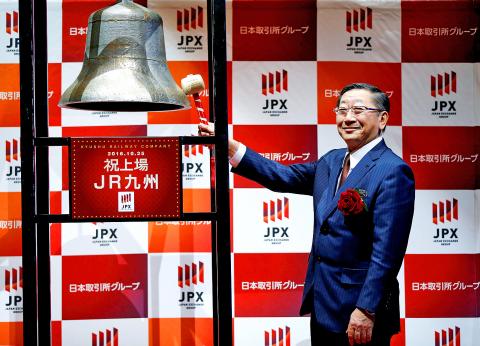Kyushu Railway Co shares rose on their first day of trading in Tokyo after the Japanese government raised ¥416 billion (US$4 billion) selling its entire stake in an initial public offering (IPO).
The stock yesterday climbed 15 percent to ¥2,990 in Tokyo after touching ¥3,120 earlier. The government sold all 160 million shares held by Japan Railway Construction, Transport and Technology Agency for ¥2,600 apiece, or the top end of a marketed range.
The shares are to start trading in Fukuoka today.

Photo: Reuters
Three of the four major Tokyo IPOs this year are trading above offer price, according to Bloomberg-compiled data.
Line Corp’s US$1.24 billion July IPO, which included a New York and Tokyo listing, is the best performer, trading more than 40 percent above its offer price of ¥3,300 a share.
Komeda Holdings Co, the worst performer of this year’s deals, is down about 15 percent.
The JR Kyushu share sale is the nation’s largest railway IPO in more than a decade and is part of Japanese Prime Minister Shinzo Abe’s efforts to encourage Japanese to invest some of their ¥1,700 trillion household savings in the stock market.
The gains in the shares of the rail operator compare with the 32 percent surge in Line’s stock on its July debut.
JR Kyushu, which operates in Japan’s third-largest island, gets most of its profit from its station and real-estate businesses that include hotels and shopping centers as non-transportation services account for about half its sales.
“We’ve focused on non-rail assets and that’s led to synergies,” company president Toshihiko Aoyagi told reporters after the listing ceremony in Tokyo. “We want to step that up in the future.”
JR Kyushu would not get any money from the offering that was marketed in a range of ¥2,400 to ¥2,600. Three-quarters of the shares were sold domestically, with the rest going to overseas investors.
The IPO followed debuts in the 1990s by East Japan Railway Co and Central Japan Railway Co after the breakup of state-run Japan Railways in 1987.
“JR Kyushu has attracted attention for its real estate, station-building and hotel expansion, but in the medium to long term, its earnings will be under pressure,” said Minoru Matsuno, president of Value Search Asset Management Co, a Tokyo-based investment advisory firm. “They need to step up their growth plans.”

Taiwanese suppliers to Taiwan Semiconductor Manufacturing Co. (TSMC, 台積電) are expected to follow the contract chipmaker’s step to invest in the US, but their relocation may be seven to eight years away, Minister of Economic Affairs J.W. Kuo (郭智輝) said yesterday. When asked by opposition Chinese Nationalist Party (KMT) Legislator Niu Hsu-ting (牛煦庭) in the legislature about growing concerns that TSMC’s huge investments in the US will prompt its suppliers to follow suit, Kuo said based on the chipmaker’s current limited production volume, it is unlikely to lead its supply chain to go there for now. “Unless TSMC completes its planned six

Intel Corp has named Tasha Chuang (莊蓓瑜) to lead Intel Taiwan in a bid to reinforce relations between the company and its Taiwanese partners. The appointment of Chuang as general manager for Intel Taiwan takes effect on Thursday, the firm said in a statement yesterday. Chuang is to lead her team in Taiwan to pursue product development and sales growth in an effort to reinforce the company’s ties with its partners and clients, Intel said. Chuang was previously in charge of managing Intel’s ties with leading Taiwanese PC brand Asustek Computer Inc (華碩), which included helping Asustek strengthen its global businesses, the company

Power supply and electronic components maker Delta Electronics Inc (台達電) yesterday said second-quarter revenue is expected to surpass the first quarter, which rose 30 percent year-on-year to NT$118.92 billion (US$3.71 billion). Revenue this quarter is likely to grow, as US clients have front-loaded orders ahead of US President Donald Trump’s planned tariffs on Taiwanese goods, Delta chairman Ping Cheng (鄭平) said at an earnings conference in Taipei, referring to the 90-day pause in tariff implementation Trump announced on April 9. While situations in the third and fourth quarters remain unclear, “We will not halt our long-term deployments and do not plan to

TikTok abounds with viral videos accusing prestigious brands of secretly manufacturing luxury goods in China so they can be sold at cut prices. However, while these “revelations” are spurious, behind them lurks a well-oiled machine for selling counterfeit goods that is making the most of the confusion surrounding trade tariffs. Chinese content creators who portray themselves as workers or subcontractors in the luxury goods business claim that Beijing has lifted confidentiality clauses on local subcontractors as a way to respond to the huge hike in customs duties imposed on China by US President Donald Trump. They say this Chinese decision, of which Agence